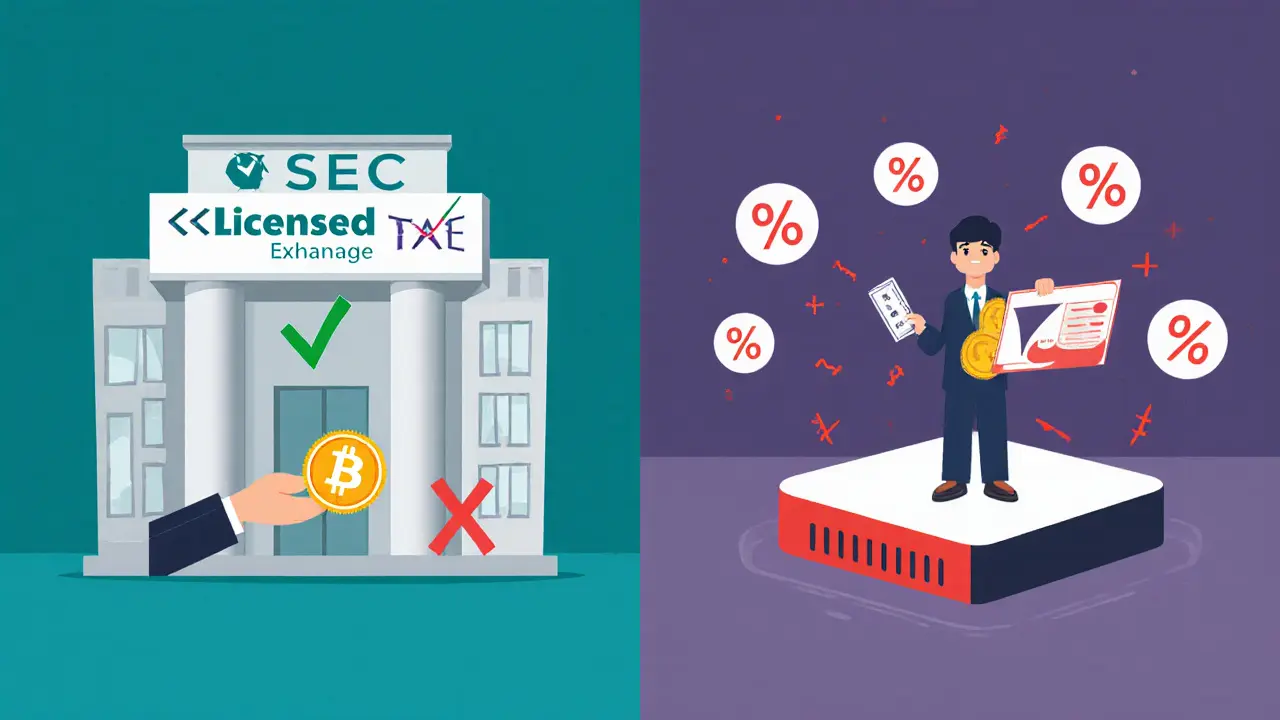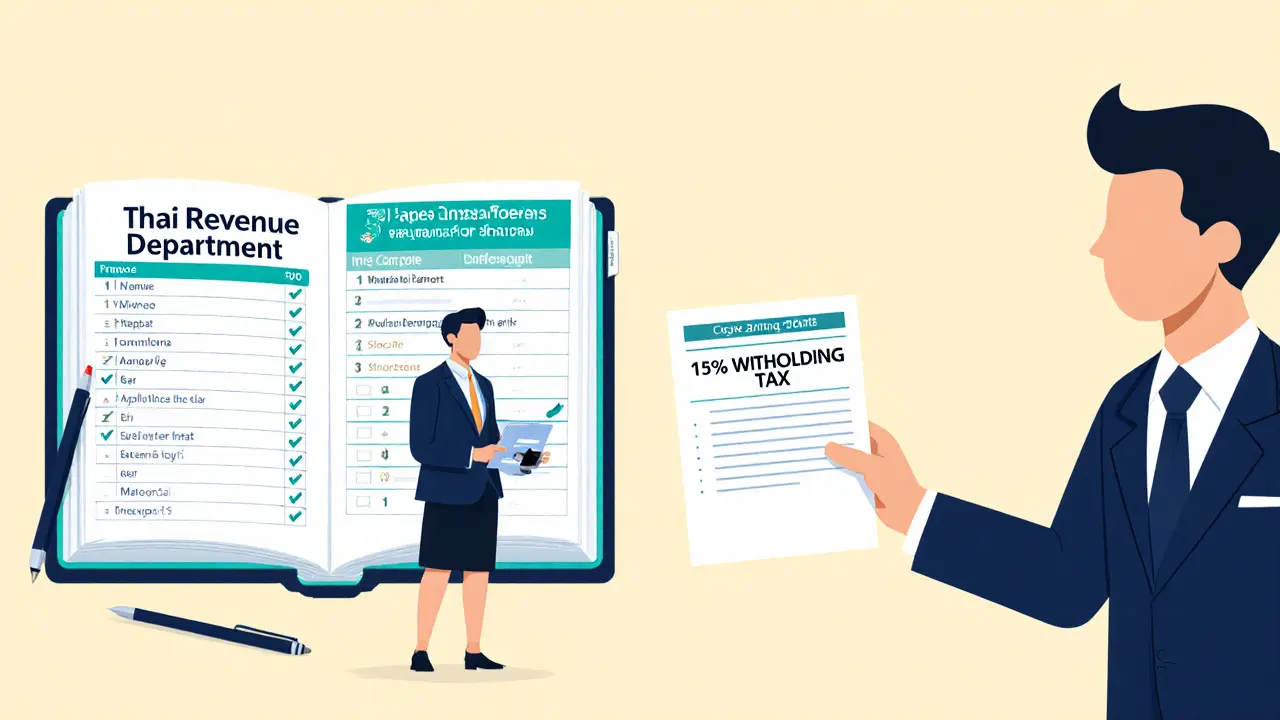Thailand Cryptocurrency Tax Explained: 5‑Year Exemption vs 15% Withholding Tax
 Sep, 13 2025
Sep, 13 2025
Thai Crypto Tax Calculator
Calculate Your Crypto Tax Liability
Determine if your cryptocurrency transactions qualify for Thailand's 5-year tax exemption (2025-2029)
Results will appear here after calculation
When you hear "cryptocurrency tax in Thailand" most people assume a flat 15% gains tax. The reality is far more nuanced, and the rules changed dramatically at the start of 2025. This guide walks you through the 5‑year personal income tax exemption, the remaining 15% withholding tax for foreign entities, and the practical steps you need to stay compliant.
What the 2025‑2029 Crypto Tax Exemption Means
Cryptocurrency tax in Thailand is now governed by Ministerial Regulation No. 399 (B.E. 2568) which grants a five‑year personal income tax exemption on capital gains from crypto transactions. The regulation was published on 5 September 2025, took effect on 1 January 2025, and will stay in force until 31 December 2029. In plain language, if you are a Thai tax resident and you sell or transfer crypto on a platform licensed by the Thai SEC, you won’t pay personal income tax on any profit you make during that window.
The exemption is a strategic move to attract traders, startups, and investors to Thailand’s domestic digital‑asset ecosystem. The government estimates it will boost market activity enough to generate about $1 billion in annual revenue, even without taxing the gains directly.
Who Gets the Exemption and Who Doesn’t
Understanding the eligibility criteria is crucial. The exemption applies only when the following conditions are met:
- You are a Thai tax resident (meaning you spend more than 180 days in Thailand per year).
- The transaction is executed through a digital‑asset exchange, broker, or dealer that holds a license from the Thai Securities and Exchange Commission (SEC) under the 2018 Digital Asset Business Decree.
- The profit comes from the sale or transfer of a cryptocurrency or digital token. Income from mining, staking, lending, or derivatives is excluded.
If any of these points fail, the profit is taxable under the standard personal income‑tax brackets (0 %‑35 % depending on total annual income). Companies face corporate tax rates up to 20 % on crypto‑related revenue.
Below is a quick snapshot of qualifying vs non‑qualifying activities:
| Activity | Platform Type | Tax Rate (2025‑2029) |
|---|---|---|
| Sale of BTC, ETH, etc. | SEC‑licensed exchange | 0 % (exempt) |
| Sale of the same assets | International or unlicensed exchange | 0 %‑35 % (personal brackets) |
| Staking rewards | Any platform | Taxed as ordinary income (up to 35 %) |
| Crypto lending interest | Licensed or unlicensed | Taxed as ordinary income |
| Mining profits | Any platform | Taxed as ordinary income |
The 15% Withholding Tax for Foreign Entities
While Thai residents benefit from the exemption, foreign companies that earn crypto income in Thailand still face a 15 % withholding tax. This tax is deducted at the source and remitted to the Thai Revenue Department. It applies to any crypto‑related service fee, royalty, or profit originating from a non‑resident entity, regardless of where the crypto is held.
If you run a crypto exchange, payment gateway, or DeFi protocol that serves Thai users, you must register with the Thai Revenue Department, collect the 15 % withholding tax from your Thai clients, and file the appropriate forms. Failure to do so can result in penalties and the loss of the ability to operate legally in Thailand.

How to Keep Records and Report Correctly
Even though many gains are tax‑free, the law still requires you to keep detailed records. Here’s what you should track:
- Date of each transaction.
- Type of crypto (e.g., Bitcoin, Ether, USDT).
- Quantity bought or sold.
- Value in Thai Baht at the time of the transaction.
- Name of the licensed platform used.
- Whether the profit qualifies for the exemption.
When filing your annual personal income tax return, include a separate schedule that lists all crypto transactions. Mark the exempt trades with a note such as "Exempt under Reg. 399" and attach screenshots of the exchange’s license page as supporting evidence.
Companies must file a corporate tax return and disclose crypto‑related revenue in the same way they would for any other business line, distinguishing exempt and taxable items.
Tax Planning Tips to Reduce Your Liability
Even with the exemption, clever planning can keep you ahead of the curve:
- Shift activity to licensed exchanges. If you currently trade on an offshore platform, move to a Thai SEC‑licensed venue to capture the tax break.
- Use tax‑loss harvesting. Selling a losing position on a licensed exchange can offset gains from other crypto sales, reducing any taxable amount that falls outside the exemption.
- Time your trades. The exemption only lasts until the end of 2029. If you anticipate a large gain after that, consider realizing some profit earlier to lock in the zero‑rate period.
- Separate staking and lending activities. Keep these in a different wallet or account so you can clearly differentiate taxable income from exempt capital gains.
Remember, the exemption does not eliminate the need for record‑keeping; you still have to prove that each gain meets the criteria.

Common Pitfalls to Avoid
Many traders stumble over a few recurring mistakes:
- Assuming all crypto is tax‑free. Only profits from qualified trades on licensed platforms are exempt.
- Mixing P2P or DEX trades with licensed‑exchange trades in the same spreadsheet. This makes it hard to separate taxable from non‑taxable rows.
- Neglecting to report staking rewards. Thai law treats these as ordinary income, so they must appear on your tax return.
- Ignoring the 15% withholding tax if you run a foreign crypto service. The penalty for non‑compliance can be steep.
Quick Takeaways
- From 2025‑2029, Thai residents enjoy a 0 % personal income tax on crypto gains traded on SEC‑licensed platforms.
- The exemption does NOT cover mining, staking, lending, DeFi swaps, or P2P trades.
- Foreign entities still face a 15 % withholding tax on Thai‑source crypto income.
- Accurate record‑keeping and clear separation of exempt vs taxable activity are mandatory.
- Plan ahead: use licensed exchanges, harvest losses, and time large gains before the exemption expires.
Frequently Asked Questions
Do I need to report crypto gains that are exempt?
Yes. The law requires you to list all crypto transactions on your tax return, even if the profit qualifies for the exemption. Mark the exempt trades clearly so the Revenue Department can verify them.
What counts as a SEC‑licensed platform?
Any exchange, broker, or dealer that holds a license under Thailand’s 2018 Digital Asset Business Decree. You can find the list on the SEC’s website or on the exchange’s “Licensing” page.
Are DeFi swaps on Binance Smart Chain taxable?
Yes. Swaps on decentralized exchanges are considered unlicensed activity, so any profit is taxed under the regular personal income brackets.
How does the 15% withholding tax work for foreign companies?
The Thai client must deduct 15 % from any payment made to the foreign entity and remit it to the Thai Revenue Department. The foreign company can claim a credit for this tax in its home jurisdiction, if a tax treaty allows.
What happens after 31 December 2029?
Unless the government extends the exemption, crypto gains will revert to the standard personal‑income tax rates based on total annual income. Keep an eye on announcements from the Ministry of Finance.
Alisa Rosner
October 25, 2025 AT 17:38So if I trade on Binance US, I'm still taxed? But if I use a Thai exchange like Bitkub, I pay 0%? That's wild. I'm moving all my trades over ASAP. 🚀
Olav Hans-Ols
October 25, 2025 AT 23:08That’s actually kind of genius. Thailand’s playing the long game-tax the ecosystem, not the people. Smart move to lure in traders and devs. Hope other countries take notes.
MICHELLE SANTOYO
October 26, 2025 AT 07:15Oh great another government pretending crypto is 'safe' while they quietly build a surveillance state. You think they care about you? They just want your data and your liquidity. This 'exemption' is a trap.
Lena Novikova
October 27, 2025 AT 06:17People keep forgetting staking is taxable even on licensed platforms. You think the government's gonna let you slide on passive income? Nah. Read the fine print or get audited. Done.
Saurav Deshpande
October 27, 2025 AT 11:51They say exemption but really they're just preparing to confiscate everything after 2029. This is how they lure you in. Then they change the rules. You think this is about growth? It's about control. Watch.
Allison Andrews
October 27, 2025 AT 18:35It's fascinating how the exemption hinges on platform licensing rather than the nature of the asset. That means the state is essentially outsourcing tax enforcement to private entities. What happens when a licensed exchange gets hacked? Who bears the burden of proof then? The user? The exchange? The regulator? The legal ambiguity here is staggering.
And yet, the policy assumes perfect compliance-every user knows exactly which platform is licensed, every transaction is timestamped correctly, and no one ever uses a VPN to mask their location. Reality is messier. The system seems designed for idealized users, not actual humans.
Also, the exclusion of DeFi and P2P feels arbitrary. Why is a swap on Uniswap taxable but a trade on Bitkub exempt? Both are peer-to-peer value transfers. The distinction is technical, not economic. It creates incentives to centralize, which undermines the whole ethos of crypto.
And what about cross-border traders? Someone living in Thailand but using a foreign wallet with a Thai exchange? Are they still exempt? The regulation doesn't clarify residency vs. transaction location. This is a lawyer's paradise.
Finally, the 15% withholding tax on foreign entities feels like a power play. It's not about revenue-it's about asserting jurisdiction. If you serve Thai users, you're subject to Thai law, even if you're based in Singapore or Estonia. That’s a bold move. It could set a global precedent.
But I worry this exemption is temporary. Governments rarely give up tax revenue without a fight. This feels like a honeymoon period before the inevitable crackdown. The real question isn't how to optimize now-it's how to prepare for what comes after.
Paul Lyman
October 27, 2025 AT 19:47yo if you're not using bitkub or dxcex for your trades you're literally leaving free money on the table. stop overthinking it. just move your funds and track your stuff. the gov is giving you a gift here. dont be the guy who misses it because he's scared of spreadsheets
Dr. Monica Ellis-Blied
October 28, 2025 AT 12:37While this exemption is undoubtedly beneficial, we must not overlook the ethical and systemic implications of a two-tiered tax system based on platform licensing. This creates a de facto incentive to centralize financial activity within state-approved intermediaries, which contradicts the decentralized ethos of blockchain technology. Furthermore, the exclusion of staking, lending, and mining from the exemption disproportionately penalizes those who participate in network security and liquidity provision-activities that are foundational to the crypto ecosystem. This policy may boost short-term market volume, but at the cost of distorting economic behavior and reinforcing institutional control over decentralized finance. We must advocate for tax neutrality, not platform-based privilege.
Herbert Ruiz
October 28, 2025 AT 23:07Why are you even filing? If it's exempt, just ignore it. They won't catch you.
Kevin Johnston
October 28, 2025 AT 23:16This is huge!! 🎉 Time to finally go all in on Thai exchanges. 0% tax? Yes please!!
Frech Patz
October 29, 2025 AT 14:48Is there any official guidance from the Thai Revenue Department regarding the valuation methodology for crypto-to-crypto trades? The regulation mentions value in Thai Baht at time of transaction, but does it accept the exchange rate from the licensed platform, or must it be derived from a third-party index? This detail is critical for accurate reporting.